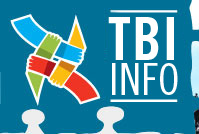You are here : Home > Library > Experiences, perspectives, and needs of patients and their close (...) > 2000 > Perlesz, A., Kinsella, G., & Crowe, S. (2000). Psychological distress (...)
Perlesz, A., Kinsella, G., & Crowe, S. (2000). Psychological distress and family satisfaction following traumatic brain injury: injured individuals and their primary, secondary, and tertiary carers. Journal of Head Trauma Rehabilitation, 15(3), 909-927.
Objective: To assess family psychosocial outcome following traumatic brain injury (TBI) in all family members, including relatives more peripheral to the person with the injury. Design: A cross-sectional design was used to gather outcome data from individuals with TBI and primary, secondary, and tertiary carers, 19.3 months posttrauma. Multivariate analyses of variance (ANOVAs) ascertained differences in levels of psychological distress and family satisfaction within families. Settings and participants: Seventy-nine families (65 individuals with TBI, 72 primary carers, 43 secondary carers, and 22 tertiary carers) were drawn from a sample of outpatients of three metropolitan, acute rehabilitation hospitals over a 12-month period. Outcome measures: In addition to using the Family Satisfaction Scale (FSS), measures of psychological distress included the Beck Depression Inventory (BDI), State Anxiety Inventory (SAI), and Profile of Mood States (POMS). Results: Although it was noted that a significant proportion of family members were not psychologically distressed and reported good family satisfaction, people with TBI remain at greater risk of poor psychosocial outcome than do their relatives. Of other family members, primary carers-particularly wives-are at greatest risk of poor psychosocial outcome, and a number of secondary and tertiary carers also displayed high levels of psychological distress. Conclusions: Male relatives (the majority of whom were secondary or tertiary carers) may report their distress in terms of anger and fatigue, rather than as depression and anxiety. Future research could develop TBI-specific measures of anger and fatigue as screening instruments to identify peripheral family members requiring assistance in adapting to TBI. Many families-despite their initial traumatic experience-eventually cope well, encouraging researchers and clinicians to focus future research efforts on those families who have made good adjustments to TBI.
Terms of Use | 2007-2008 All rights reserved © INFO-TBI. Graphic design : François Ménard | Design : WebConforme

